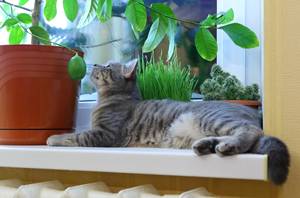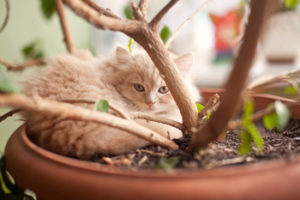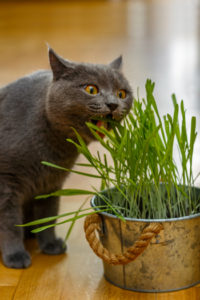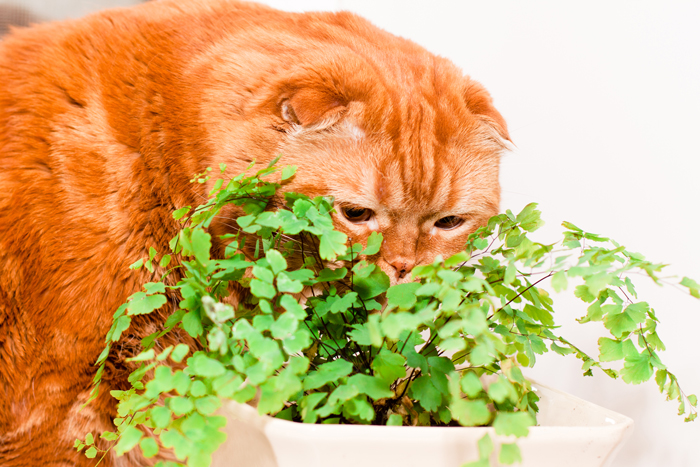No matter how tempting they might be, you can train your cat to leave them alone.
It’s impossible to explain to a cat that the beautiful new palm tree in a stunning ceramic pot in the living room is not a litter box.

Grigorii_Pisotckii/iStock
A cat sees soil and can’t resist the temptation to scratch around in the dirt, flicking it all over the floor and then proceeding to pee or poop. It’s instinctive behavior. To the make matters worse, the trunk of the plant is “interpreted” to be a scratching post. And the palm fronds? Well, from a feline perspective, they are designed for batting around and playing with because they “respond” by moving.
Read more about our unique Cat Training course.
You need to keep your cats out of your houseplants for two reasons: 1) to prevent messes and their associated bad smells; and 2) to keep your cats safe and healthy—many houseplants are toxic to pets. Silk plants are not always the answer because some cats will still play with them and attempt to chew on them, too.

_lolik_/iStock
It’s essential that you let your cat know that all your indoor houseplants—irrespective of size—are a No Cat Zone right from the very beginning. Ordinary kitchen ground white pepper is your new best friend. If you sprinkle the soil area of the pot and the lower leaves, you cat will come, sniff, sneeze—and leave it alone.
If your cat persists with her digging adventures, consider placing small decorative stones to mask the soil in your pots. Don’t go for anything too small as some cats may be tempted play and swallow them. If your kitty is still showing interest, place a layer of chicken wire over the soil and then place the stones on top of it.

NataliaSokko/iStock
When it comes to stopping your cat from playing with the leaves, consider spraying some nontoxic bitter aloes onto them. This is the same product used to stop nail biting and is available from pharmacies.
You can also divert her attention away from your decorative foliage by giving her a little container of fresh catnip or wheat grass placed strategically near her water or food bowl. This should satisfy her craving for edible greenery and keep your houseplants intact.
Finally, when you are shopping for houseplants, keep in mind that some favorites, such as orchids and African violets, are nontoxic and a safer bet—just in case your cat attempts to nibble….
The following houseplants are listed as highly toxic and should be avoided if your cat shows too much interest in your indoor greenery.
- Lilies: As beautiful as they are, they are highly toxic to pets and can cause severe kidney damage.
- Tulip/Narcissus: The bulb portions of these plants contain toxins that can cause intense gastrointestinal irritation, drooling, loss of appetite, central nervous system depression, convulsions and cardiac abnormalities.
- Cyclamen: This plant contains cyclamine; the highest concentration of this toxic component is typically located in the tuber (root) portion of the plant.
- Kalanchoe: This plant can cause gastrointestinal irritation and also seriously affect cardiac rhythm and heart rate.
- Poinsettia: The plant’s brightly colored leaves contain a sap that is irritating to the tissues of the mouth and esophagus.
About the Author: Sandy Robins is the 2013 winner of the “Excellence in Journalism and Outstanding Contribution to the Pet Industry Award.” Her work appears on many of the country’s leading pet platforms, such as MSNBC.com, MSN.com and TODAYShow.com. She is a regular contributor and columnist in multiple national and international publications, including Catster, as well as the author of the award-winning books “Fabulous Felines: Health and Beauty Secrets for the Pampered Cat” and “For The Love of Cats.” Learn more about Sandy on her website or Facebook page. #welovecats





